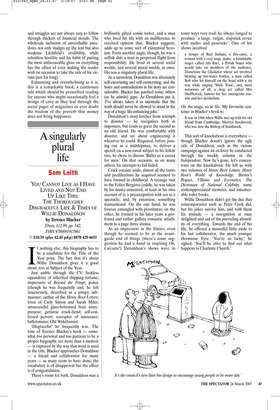A singularly plural life
Sam Leith
YOU CANNOT LIVE AS I HAVE LIVED AND NOT END UP LIKE THIS: THE THOROUGHLY DISGRACEFUL LIFE BL TIMES OF WILLIE DONALDSON by Terence Blacker Ebury, £12.99, pp. 342, ISBN 9780091913861 ✆ £10.39 (plus £2.45 p&p) 0870 429 6655 If nothing else, this biography has to be a candidate for the Title of the Year prize. The fact that it’s about Willie Donaldson gives it a good shout, too, at Subject of the Year.
Just amble through the CV: feckless squanderer of inherited shipping fortune; impresario of Beyond the Fringe; ponce (though he was frequently and, he felt inaccurately, described as a pimp); submariner; author of the Henry Root Letters; lover of Carly Simon and Sarah Miles; unsuccessful glass-bottomed boat entrepreneur; geriatric crack-fiend; self-confessed pervert; corrupter of innocence; balletomane; Old Wykehamist.
‘Disgraceful’ he frequently was. The tone of Terence Blacker’s book — somewhat too personal and too partisan to be a proper biography, yet more than a memoir — is captured by the way that word is used in the title. Blacker approaches Donaldson — a friend and collaborator for many years — as many seem to have done: the vocabulary is of disapproval but the effect is of congratulation.
There’s room for both. Donaldson was a brilliantly gifted comic writer, and a man who lived his life with an indifference to received opinion that, Blacker suggests, adds up to some sort of existential heroism. From another angle, though, he was a selfish shit: a man in perpetual flight from responsibility. He lived in several social worlds, and several moral worlds, at once. His was a singularly plural life.
As a memoirist, Donaldson was alternately self-excoriating and self-exonerating, and the holes and contradictions in his story are considerable. Blacker has patched some; others (as he admits) gape. As Donaldson put it, ‘I’ve always taken it as axiomatic that the truth should never be allowed to stand in the way of a huge, life-enhancing joke.’ Donaldson’s story lurches from triumph to disaster — he recognises both as imposters, but tends to greet the second as an old friend. He was comfortable with disaster, and set about engineering it wherever he could. Required, before passing out as a midshipman, to deliver a speech on a non-naval subject to his fellow tars, he chose to discuss ‘Ballet as a career for men.’ On that occasion, as on many others, his attempts to fail failed.
Crack cocaine aside, almost all the tastes and predilections he acquired seemed to have formed in childhood. A teenage visit to the Folies Bergères (oddly, he was taken by his mum) cemented, at least in his own account of it, a preoccupation with sex as a spectacle; and, by extension, something transactional. On the one hand, he was forever entangled with prostitutes; on the other, he formed in his later years a profound and rather gallant romantic attachment to a page three stunna.
As an impresario in the Sixties, even though he seemed to be at the avantgarde end of things (there’s some suggestion he had a hand in inspiring Oh, Calcutta!) Donaldson’s shows were in some ways very trad: he always longed to produce ‘a large, vulgar, slapstick revue with nudes and peacocks’. One of his shows involved
a troupe of Red Indians, a fire-eater, a woman with a very large snake, a formidable singer called Ida Barr, a Polish boxer who would take on members of the audience, Demetrius the Gladiator whose act involved blowing up hot-water bottles, a man called Bob who hit himself on the head with a tin tray while singing ‘Mule Train’, and, most notorious of all, a drag act called Mrs Shufflewick, famous for her outrageous routine and her alcoholism.
On the stage, so in life. My favourite sentence in Blacker’s book is:
It was in 1966 when Willie met up with his old friend from Cambridge, Mervyn Stockwood, who was now the Bishop of Southwark.
This sort of knockabout is everywhere though Blacker doesn’t ignore the ugly side of Donaldson, such as the vicious campaign against an ex-lover he conducted through his weekly column in the Independent. Now he’s gone, let’s concentrate on the knockabout. He left us with two volumes of Henry Root Letters, Henry Root’s World of Knowledge, Brewer’s Rogues, Villains and Eccentrics, The Dictionary of National Celebrity, some underappreciated memoirs, and innumerable toilet books.
Willie Donaldson didn’t get the due that contemporaries such as Peter Cook did, but his jokes survive him, and with them his attitude — a recognition at once delighted and sad of the prevailing absurdity of everything. Towards the end of his life, he offered a mournful little aside to his last collaborator, the much younger Hermione Eyre. ‘You’re so lucky,’ he sighed. ‘You’ll be alive to find out what happens to Charlotte Church.’


















































































 Previous page
Previous page